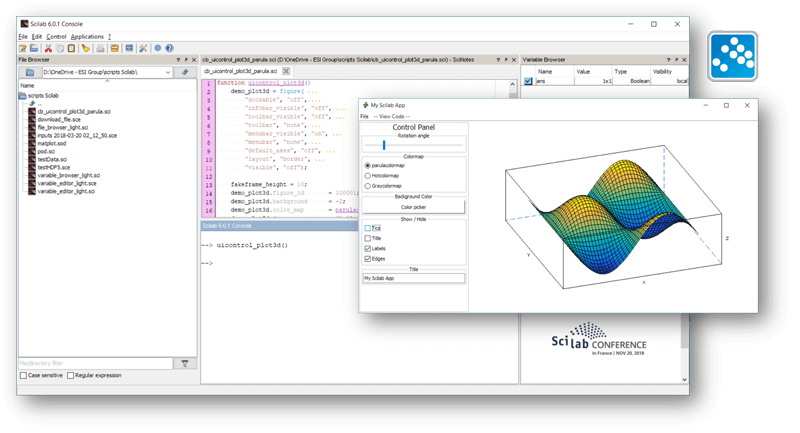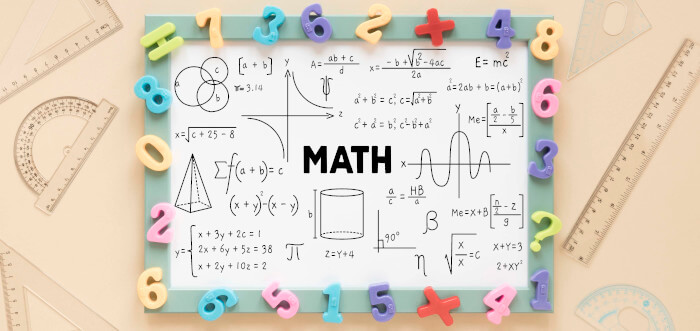Scilab is a numerical computational package developed by INRIA and École nationale des ponts et chaussées (ENPC), both organisations located in France.
It is a high level programming language in that most of its functionality is based around the ability to specify many computations with few lines of code. It does this primarily by abstracting primitive data types to functionally equivalent matrices.
Scilab has been designed to be an open system where the user can define new data types and operations on these data types by using overloading.
Scilab includes hundreds of mathematical functions. It has a high level programming language allowing access to advanced data structures, 2-D and 3-D graphical functions.
Scilab syntax is largely based on the MATLAB language.
The software has been in development since 1994.
Features include:
- 2-D and 3-D graphics, animation.
- Linear algebra, sparse matrices.
- Polynomials and rational functions.
- Interpolation, approximation.
- Simulation: ODE solver and DAE solver.
- Scicos: a hybrid dynamic systems modeler and simulator.
- Classic and robust control, LMI optimization.
- Differentiable and non-differentiable optimization.
- Signal processing.
- Metanet: graphs and networks.
- Parallel Scilab.
- Statistics.
- Interface with Computer Algebra: Maple package for Scilab code generation.
- Interface with Fortran, Tcl/Tk, C, C++, Java, LabVIEW.
- Xcos provides a new state of the art user interface for Scicos (INRIA) which allows to take all advantages of the powerful simulator.
- ATOMS is an embedded packaging system for Scilabmodules (toolboxes).
- LaTeX/MathMl.
- Unified and consistent API.
- SciNotes Text editor:
- Code navigator.
- On-the-fly typing completion.
- Multiple editor instances management.
- GUI customization.
- Last session restoration.
- Tabs drag & drop management.
- Advanced scripting capabilities.
- Cross-platform support – runs under Linux, macOS, and Windows.
Website: www.scilab.org
Support: Documentation, Tutorials, Wiki
Developer: Institut national de recherche en informatique et en automatique (INRIA)
License: CeCILL license

Scilab is written in C++, C, and Java. Learn C++ with our recommended free books and free tutorials. Learn C with our recommended free books and free tutorials. Learn Java with our recommended free books and free tutorials.
Return to Scientific | Return to Computer Algebra Systems
| Popular series | |
|---|---|
| The largest compilation of the best free and open source software in the universe. Each article is supplied with a legendary ratings chart helping you to make informed decisions. | |
| Hundreds of in-depth reviews offering our unbiased and expert opinion on software. We offer helpful and impartial information. | |
| The Big List of Active Linux Distros is a large compilation of actively developed Linux distributions. | |
| Replace proprietary software with open source alternatives: Google, Microsoft, Apple, Adobe, IBM, Autodesk, Oracle, Atlassian, Corel, Cisco, Intuit, and SAS. | |
| Awesome Free Linux Games Tools showcases a series of tools that making gaming on Linux a more pleasurable experience. This is a new series. | |
| Machine Learning explores practical applications of machine learning and deep learning from a Linux perspective. We've written reviews of more than 40 self-hosted apps. All are free and open source. | |
| New to Linux? Read our Linux for Starters series. We start right at the basics and teach you everything you need to know to get started with Linux. | |
| Alternatives to popular CLI tools showcases essential tools that are modern replacements for core Linux utilities. | |
| Essential Linux system tools focuses on small, indispensable utilities, useful for system administrators as well as regular users. | |
| Linux utilities to maximise your productivity. Small, indispensable tools, useful for anyone running a Linux machine. | |
| Surveys popular streaming services from a Linux perspective: Amazon Music Unlimited, Myuzi, Spotify, Deezer, Tidal. | |
| Saving Money with Linux looks at how you can reduce your energy bills running Linux. | |
| Home computers became commonplace in the 1980s. Emulate home computers including the Commodore 64, Amiga, Atari ST, ZX81, Amstrad CPC, and ZX Spectrum. | |
| Now and Then examines how promising open source software fared over the years. It can be a bumpy ride. | |
| Linux at Home looks at a range of home activities where Linux can play its part, making the most of our time at home, keeping active and engaged. | |
| Linux Candy reveals the lighter side of Linux. Have some fun and escape from the daily drudgery. | |
| Getting Started with Docker helps you master Docker, a set of platform as a service products that delivers software in packages called containers. | |
| Best Free Android Apps. We showcase free Android apps that are definitely worth downloading. There's a strict eligibility criteria for inclusion in this series. | |
| These best free books accelerate your learning of every programming language. Learn a new language today! | |
| These free tutorials offer the perfect tonic to our free programming books series. | |
| Linux Around The World showcases usergroups that are relevant to Linux enthusiasts. Great ways to meet up with fellow enthusiasts. | |
| Stars and Stripes is an occasional series looking at the impact of Linux in the USA. | |
